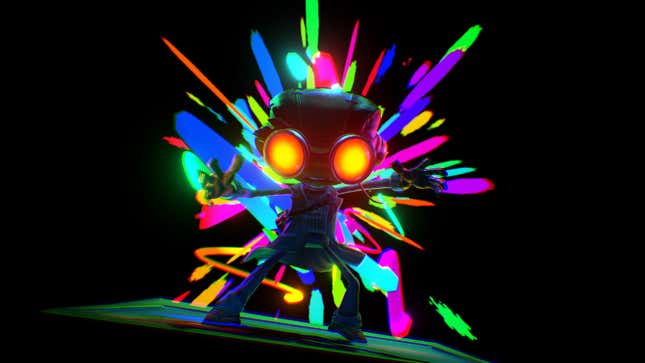
Psychonauts 2, the long-awaited sequel to Psychonauts, is a bright, frothy, wholesome game about deep, dark, unspeakable things. Trauma, PTSD, depression, anxiety, loneliness… beneath the squeaky-clean formica and bakelite of Psychonauts HQ lies a world humming with energy, and a story laced with profundity.
This story originally appeared on Kotaku Australia.
Tim Schafer, creative director and writer, is no stranger to stories with surprising heft. He’s responsible for co-writing The Secret of Monkey Island, The Curse of Monkey Island and Day of the Tentacle, and he was head writer of Full Throttle, Grim Fandango, Brutal Legend, Broken Age. The man is a force of nature.

PSYCHONAUTS 2: THE KOTAKU REVIEW
Psychonauts 2 isn’t about gunning down the big boss at the end and cheering over their dead body. It’s about understanding that even the biggest asshole is still a person, and deep down they may just need some help.
Psychonauts 2 is one of the best, smartest, kindest games of the past decade. And given the heft of the themes being dealt with in the game, I thought it appropriate to sit down for a long, deep dive with the man himself.
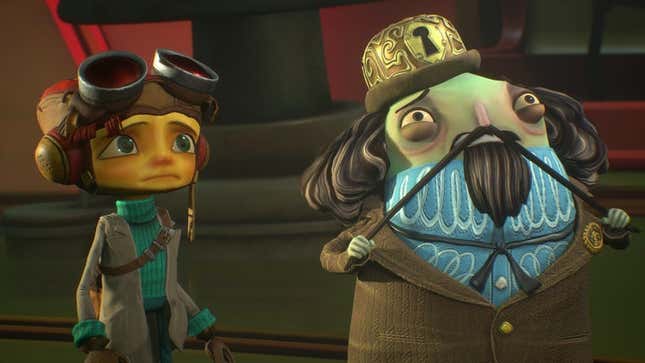
Kotaku: We’re sitting here in 2021. And there’s a line quite early in the game, where Hollis (a superb new character) tells Raz “Focus. Only one unfathomable fear at a time”. This is… my new mantra. I have to ask.. how much of the world over the past however many years, and all it’s awful eccentricities, informed the story of Psychonauts 2?
Tim Schafer, Psychonauts 2 creative director and Double Fine founder: I mean, life creeps in in funny ways all the time! All the dialogue I write is often… you know, taken from overheard dialogue, things I’ve heard friends and the way they’ve talked about things. A lot of the perspectives of the characters are different than my own, but ones I’ve observed in the world. And sometimes things you’re going through, and your own personal stresses on that day, come out of characters mouths. And it’s very surprising when that happens, but Hollis was… that was something written in the later years of the projects, so I definitely think that was a sign of the times, but not meant to be topical in any way – it’s timeless. It’s funny… there are other lines in there, about peaceful protests, that was written long ago. Way before a lot of the protests… I mean, there’ve always been protests, but, you know. Some things seem topical, but aren’t.
Well you paint with the colours that you’ve got around you, right? And a lot of these themes really are evergreen. But what made you want to tell this specific story in the first place?
Schafer: Well, ever since the first game, we had these open-ended questions. We had this kind of curse, put on Raz’s family to die in the water, cursed by fortune tellers, and I had this idea for the mystery behind that, and what it meant. Also, Ford Cruller had this interesting personality, where he was many different personalities. He was teleporting around camp, and that was never really explained – how he could do that, or what happened to him, but I always imagined it was because of a giant battle with an arch-enemy psychic, some kind of villain… but I did have a backstory document I wrote at the time, but I’m just so happy to be able to bring them to life fifteen years later. And there’s also a whole bunch of new ideas, story and plotlines that we came up with with the new people in the team, so… it all fits together, and works well together!
Well one of the things that strikes me is that Raz is… well, yanked down a notch. Because he was pretty much a big fish in a small pond in the first story, so there’s… you know, disrespect, hazing, some light bullyinh… is that because you’re trying to say something about what it’s like to be in a place where you suddenly don’t have a handle on things anymore?
Schafer: Well, it’s just… you know, the stakes are higher now. He’s not at camp anymore – he’s at the headquarters of an international spy organization, so whatever field promotion he got before doesn’t really count! And so while he’s the lowest rung on the ladder, he’s also in a much more important place, and has bigger villains to fight. That’s just how stories accelerate, how they keep people interested. Plus, it’s also fun to have somewhere to climb to as a player – you don’t necessarily want to start off with superpowers right away!
Plus Raz is a kid, right? I wanted to ask what it is about Children that you think makes them such compelling eyes through which to view a world. I’m not just thinking of Psychonauts here – also Broken Age, where you have young people saddled with these gargantuan burdens.
Schafer: Well in both of those stories, there’s something interesting… especially Psychonauts 2. In both cases, Raz is a very earnest kid. He’s inspired by a character I saw in some old Jet Li movies, where Jet Li had a young ten-year-old cohort who did all the same moves Jet Li did, but he was just very earnest, and committed, and you know, kids don’t have that second guessing. That impostor syndrome, right? They’re just like… yeah! Let’s do this! And I really liked his earnestness. Raz has that, and his impulsiveness, but he also gets a little cocky once in a while.
In Psychonauts 2, he learns a lot like what Shay did in Broken Age… that part of growing up is you’re getting new powers all the time. You’re getting new powers of comprehension – you can drive, you can do all these things you couldn’t do before, but with that, comes the ability to hurt people. As you get older, you realise, oh. I can actually do great things, but I can also hurt people if I’m not careful. And there’s a point in this game where Raz gets a talking to about that, because he goes a little too far with his powers. He gets a talking to from Sasha about the responsibility of getting inside someone’s mind.
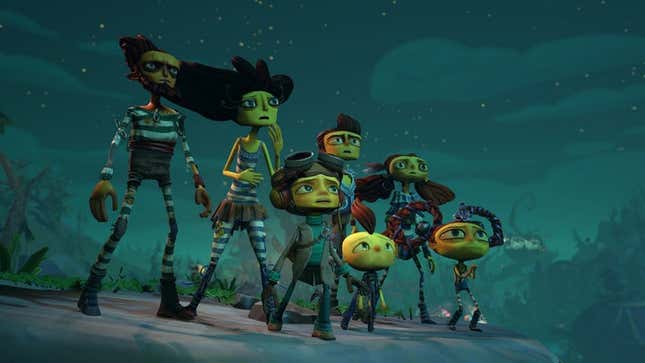
Right. Well, a lot of authors write from their worldview, their lived experiences, and write themselves into their stories. So who is Raz? I mean, is there any of you in Raz? Were you raised in the circus?
Schafer: (Laughing) I don’t know! You know, I’d consider it a failing if my main character was me. That’s an easy trap to fall into, right? ‘Cos one of the things you learn in writing classes is this: your voice is one voice. But all your characters can’t talk in your voice, otherwise it’s just a big monologue. And so I think if you’ve really developed your characters, they get their own voices, and they say things that surprise you.
The best writing is, in some ways, surprising to the author. Raz isn’t me – he’s his own very self -possessed individual, and I hope all the characters in the game say things I would never say! That being said, they do all come from me… so I must find that character in my head somewhere, for sure!
You’re starting to sound like you need someone to whack a door in the back of your head, head in and defrag all the stuff in there.
Schafer: It’s like letting someone read your dream diary, right? Sometimes you put things in, and you’re telling someone your dream, and you realise… oh, god, I know what this is about, as you’re telling them. But I was telling someone once that when I was a kid, there was a kid called Bobby who used to pick on us. And they were like, Bobby, like Bobby Zilch in Psychonauts? And I was like… uggggh. No. I didn’t grow up and name the bully after the kid who threw all my tadpoles back in the pond, did I? But see, you reveal this stuff. If you’re doing art, or writing, you’re always revealing stuff without realizing it.
Well I think, by that logic, you’ve revealed that you’re an optimist. All of your games seem to have this through line of unlikely heroes, and optimism. But also, I think you think… and I believe this more now than ever, having played the game… that everyone has baggage. Is that true?
Schafer: Everyone has exactly five items of emotional baggage, that need to be sorted, yes! No, but I think it’s one of the things we were aware of in the first game… even the villains in Psychonauts are redeemed, because you go into their heads and go, ohhhh. Now I see what they’re wrestling with. You see this representation of Coach Oleander’s father, for example, in his mind. And it’s not like it excuses all behaviour, but you can’t help but empathise with someone. Once you’ve gone inside their mind, and seen what they’re wrestling with.
One of my favourite quotes in Psychonauts 2 is, “We’re not here to change peoples minds, to fix people. We’re here to help people fight their own demons.”
Schafer: Right! And there are all kinds of people. Some people have definitely done inexcusable things, and it’s not like I think you could go fight a boss monster in their head and make them better! At all! But your average person that you meet … and this is advice I got early on in life.
To be kind to people, ‘cos you never know what they’re dealing with inside their heads. I think that’s definitely a good rule when approaching people in life. It doesn’t mean that every mass-murderer is one boss fight away from being released, but… I think for regular people you meet during the day day, you should extend them a little empathy.
But you can’t carry around a small door, and jus whack it on the back of a mugger, dive in…
Schafer: I mean, that might be interesting. Might be very scary… but very interesting!
If you describe Psychonauts 2 to people, it sounds, on paper, like… well, therapy.
Schafer: Action therapy! Therapy: With Punching!
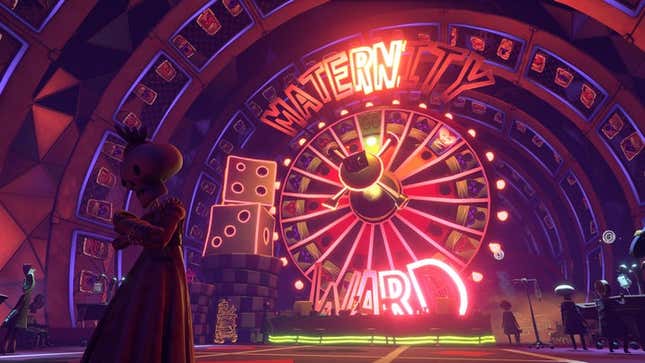
Do you think therapy plays in as a device here? And do people bring that to the game?
Schafer: It’s something that didn’t really occur to me when I made the first game. But we were in the studio recording voices for the second one, and one of the actors said “you know the thing I like about this game? Every level is about healing.” And… wow. I mean, Raz leaves every brain better off than when he arrived in it. In a shooting game, I might enter a warehouse and it’s on fire and collapsing as I leave.
With Raz, he definitely leaves every brain better off having visited, and I think that’s the job of the Psychonauts: not fixing brains, but helping people visualize how they can take on their inner demons. And one small thing that’s different this time is that Raz gets consent, before he goes into each mind, unless it’s an emergency. It occurred to me sometime between the first and second game that going into someone’s mind is an incredibly invasive procedure. You should probably get consent first, right? So he does now! And it’s proposed as a wellness check, it is part of normalising therapy.
Like, Cassie will say “Oh, good! I haven’t had a checkup in a while.” So there is that touch to it.
Do you feel like writing this game has kind of… have you learned from the story that you wrote? Have you learned anything about, for lack of a better term, the human condition?
Schafer: I think so. I think games are art, and whenever you’re creating art, especially art like this – where you don’t know how it’s going to end up – I feel like you’re getting in touch with something. You’re trying to make a connection, with the audience, because you’re revealing yourself to them… but you’re also making discoveries of your own. And I think it’s often hard to point it out, to write it out in a sentence, like ‘I learned X about myself’. It’s more like a feeling, or a general emotional development, that I think makes it really rewarding to create, and take in, art.
You think that’s applicable to all your projects? I mean, what did you learn from Manny Calavera? What did you learn from Ben? Everything you write seems to have a certain point of view, and I never come away feeling like I’ve taken something away from the game world. I always feel like I’ve added something. Do you think you’ve had a constant worldview or has it shifted and evolved as you’ve told your stories?
Schafer: I think it’s where those characters took me. I think, you know, they all have their own realities, their own points of view, so I think each one… look, I hopefully didn’t impose anything on them! I hope they speak their own truth, even though sometimes I agree with it, and sometimes I don’t… but all of our heroes make good choices. I mean, better choices than I would have made. Maybe!
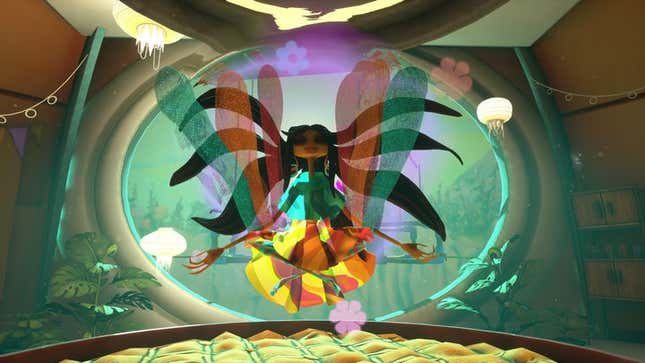
Yeah! Now, the game starts with a mental health warning, stating that the game will deal with some very serious conditions. You really couch it really well. But what I’m curious about is how do you – someone inclined to make funny – how do you blend trauma and PTSD with comedy, and can those two work together?
Schafer: Yeah, I think it’s having an empathetic view of the entire breadth of the human condition. If you’ve lived a along time – like some of us have! – you’ve seen the ups and the downs of life, and that doesn’t mean that life stops being funny. You know? Just because you’ve experienced great tragedy. I often bring up Kurt Vonnegut, just because I grew up reading him in high school. And his stories are always that way. Always incredibly tragic and incredibly funny at the same time – Slaughterhouse Five is very bleak, but super hilarious, so… it’s always just seemed to me that’s what life is like: incredibly funny and ridiculous, and tragic. Everyone experiences that almost every day.
Vonnegut talks about those aliens that experience time like a mountain range viewed in a painting, right?
Schafer: Unstuck in time.
Yeah! Do you ever use that? Do you find that with traumatic events it’s useful to pan out and view the whole picture?
Schafer: (Laughing) Maybe that’s what makes it bearable … unstuck in time, looking down on everything. But I think in some ways that’s how your life feels when you’re older, like myself. Sometimes you’re looking back, and you do have this history, all there, all at once, the good parts and the bad. And it just gives you sense of… an appreciation for a very mundane happy day you had. And you see it, and are like … yes! This is precious, I should celebrate this… a picnic, chilling out at the house… because life, the whole range of life, can be… I don’t wanna say much worse, but it just puts you in touch with what matters. …How’d we get all dark and heavy talking about this game? It’s fun! Did I mention it’s fun? (He laughs)
Well there’s dark stuff in this game, but we’re talking about time, and the way it works… it’s so strange when at one point Raz gets back to the campsite from the first game, and he’s like… Woah. I haven’t been here in…
Schafer: Three days?
Three days! And as the player, it’s a really disorienting experience. But it must have been wildly weird for you, having mere days pass for Raz, but for you it was fifteen years. How does it feel picking up a story that far along down the road? And did you find that Raz had been ticking away in the background on his own? Or was he frozen in Amber?
Schafer: I mean, if you really go deep, if you learn these characters, feel them, they kind of become timeless in your head. The real challenge? We got the voice actors back! And they could sound the same! They’re all fifteen years older, but a professional voice actor can sound younger. They can just do that. But for me, Raz was this eternal character. And he just started talking again. I mean, we did research – I’ve played that first game many times, and we played it again when we started, I played it again with the team… kind of did a lot of analysis, broke it down … it was a very deliberate means of trying to understand what we made.
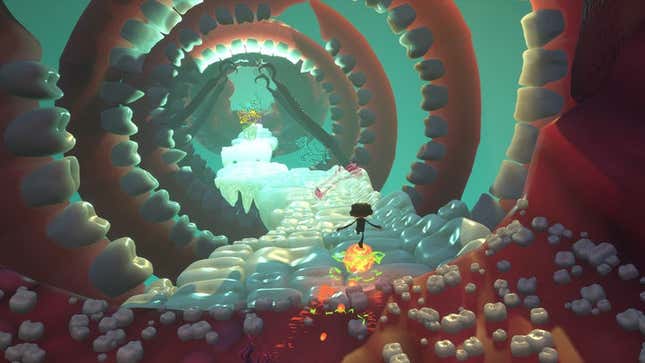
Ever try and do the whole psychic thing? Move a pencil with your mind?
Schafer: Uhhh … let’s see! Not since I was a kid. See, I think there are mysteries in this world we don’t know everything about. And I think about the human mind all the time, and I think we don’t everything about it! I mean, they’ve got new devices that can read psychic waves from outside your head. Not psychic, but you know, brain patterns, electro-magnetic… things, outside your head. And if you can change electro-magnetic fields that far away from your brain?
Schafer pauses meaningfully, raising a single eyebrow.
Schafer: Know what I’m sayin’?
Ohhhh yeah.
Schafer: What’s possible? We don’t know what’s possible.
So you’re open, huh? ‘Cos this game, man… it’s like having a needle full of optimism punched right through my breast plate!
Schafer: (Laughing) Look, it’s not like I’m anti-science! But… have you ever noticed that computers crash exactly when you don’t want them to? If you can create electromagnetic waves around your head, which we normally can’t detect… computers have thousands of bits flipping every second. Right? Millions of binary things are switching state inside a computer. Very delicate machinery. Could any of the stress you feel, when you’re trying to ship a game, when you have a big, important demo, where everyone on the project is just all these stressed-out brains hanging around the computer all the time… is it not possible that something could get thrown out of whack? And crash the system? That’s my hokey psychic question for the day.
That is interesting! But you know how you get a surge of adrenaline, of stress, when you have something big on? I was told that we’ve actually got it wrong – it’s chemicals the brain is giving you to do the thing. By that rationale… maybe the stress is what’s keeping the computers going… and someone got relaxed for a second.
Schafer: Oh my god. I never thought about that. It’s the opposite! You’re right!
So my Dad was a cop, and we only recently found out he basically has PTSD. I had to write to books to wring this out of him, and it wasn’t until he read stories based on what he did that he went, huh. That’s what I went through. Have you had anyone reach out after playing Psychonauts and say that hey, this has made me look at my traumas, and my stuff, in a new way?
Schafer: Yeah! I can’t really share any examples, but many, many letters over the years from people paying the game, saying that it helped them positively visualize healing. Helped therm… imagine fighting these things going on in their heads, and imagine they had the power to fight these things, that they weren’t out of control in these situations.
Damn. Look, thanks so much for talking, Tim. Anything else you want to throw in the blender here? Is there anything you think people have missed, or that you hope they’ll take away from Psychonauts 2?
Schafer: I thought that was an interesting conversation! I think we nailed it.
Well, thanks for that, man. I loved it. I think it’s a byzantine mess.
Schafer: Can’t wait to read it. That’s my favourite kind of mess.
Psychonauts 2 is out now for PC, PS4, Xbox and Xbox Series S/X. You can read our full review here.
Paul Verhoeven is an author, broadcaster and TV presenter. His books Electric Blue and Loose Units are out now through Penguin, and his podcasts, DISH! and Loose Units, are available everywhere you get your podcasts. You can follow him on Twitter, Instagram, and in person, if you can find him (he’s very good at hiding).